Hyundai i30 VS Maxus Deliver 9 – Specs, Efficiency & Price Comparison
Which model is the better choice – the Hyundai i30 or the Maxus Deliver 9? We compare performance (140 HP vs 204 HP), boot capacity (395 L vs ), efficiency (5.60 L vs 26.20 kWh8.80 L), and of course, the price (23600 £ vs 37200 £).
Find out now which car fits your needs better!
The Hyundai i30 (Hatchback) is powered by a Petrol or Petrol MHEV engine and comes with a Manuel or Automatic transmission. In comparison, the Maxus Deliver 9 (Cargo Van) features a Diesel or Electric engine and a Manuel or Automatic gearbox.
When it comes to boot capacity, the Hyundai i30 offers 395 L, while the Maxus Deliver 9 provides – depending on what matters most to you. If you’re looking for more power, you’ll need to decide whether the 140 HP of the Hyundai i30 or the 204 HP of the Maxus Deliver 9 suits your needs better.
There are also differences in efficiency: 5.60 L vs 26.20 kWh8.80 L. In terms of price, the Hyundai i30 starts at 23600 £, while the Maxus Deliver 9 is available from 37200 £.
Compare all the key specs now and find out which model fits your lifestyle best!
Hyundai i30
The Hyundai i30 stands out in the hatchback segment with its sleek design and modern features. It offers a comfortable ride with a well-crafted interior that caters to both driver and passengers. With its emphasis on safety and technology, the i30 provides a balanced driving experience suitable for urban and suburban environments.
details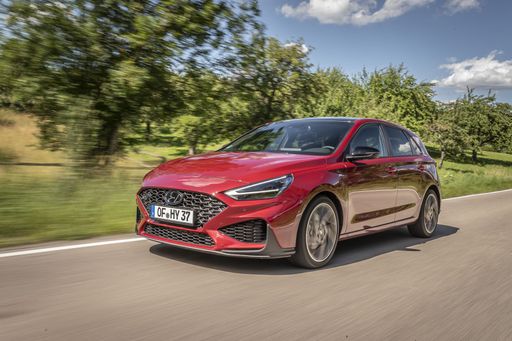 @ hyundai.news
@ hyundai.news
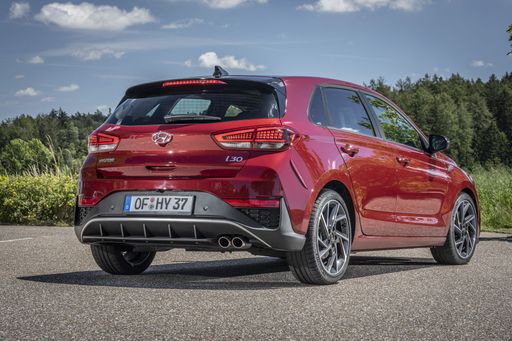 @ hyundai.news
@ hyundai.news
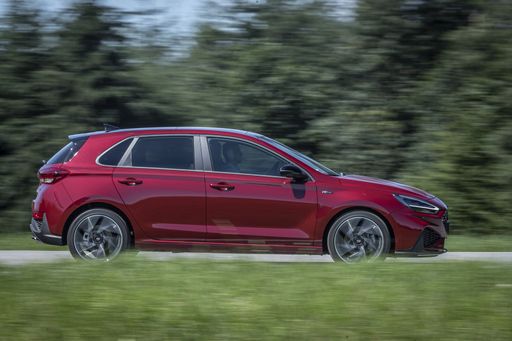 @ hyundai.news
@ hyundai.news
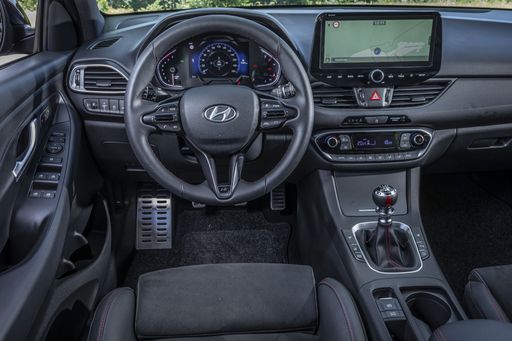 @ hyundai.news
@ hyundai.news
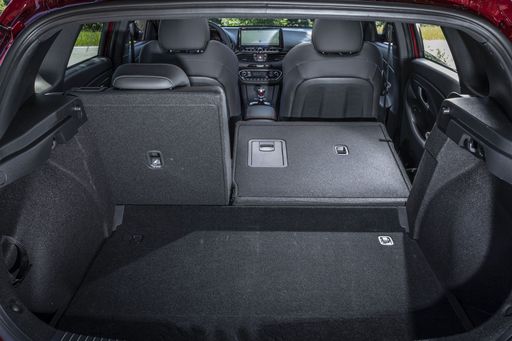 @ hyundai.news
@ hyundai.news
Maxus Deliver 9
The Maxus Deliver 9 presents itself as a robust and versatile vehicle, perfectly suited for both urban and rural deliveries. With a spacious cargo area and a modern cabin equipped with advanced technology, it caters to the needs of both driver comfort and logistical efficiency. Its sleek design and reliable performance make it an attractive option for businesses looking to upgrade their fleet.
details

|
|
|
|
|
Costs and Consumption |
|
|---|---|
|
Price
23600 - 28800 £
|
Price
37200 - 80100 £
|
|
Consumption L/100km
5.6 - 5.9 L
|
Consumption L/100km
8.80 L
|
|
Consumption kWh/100km
-
|
Consumption kWh/100km
26.2 - 38.4 kWh
|
|
Electric Range
-
|
Electric Range
265 - 358 km
|
|
Battery Capacity
-
|
Battery Capacity
-
|
|
co2
126 - 133 g/km
|
co2
0 - 254 g/km
|
|
Fuel tank capacity
50 L
|
Fuel tank capacity
-
|
Dimensions and Body |
|
|---|---|
|
Body Type
Hatchback
|
Body Type
Cargo Van
|
|
Seats
5
|
Seats
3 - 7
|
|
Doors
5
|
Doors
4
|
|
Curb weight
1291 - 1407 kg
|
Curb weight
2360 - 2870 kg
|
|
Trunk capacity
395 L
|
Trunk capacity
-
|
|
Length
4340 mm
|
Length
5546 - 5940 mm
|
|
Width
1795 mm
|
Width
2062 mm
|
|
Height
1455 mm
|
Height
2525 - 2765 mm
|
|
Payload
463 - 509 kg
|
Payload
630 - 1275 kg
|
Engine and Performance |
|
|---|---|
|
Engine Type
Petrol, Petrol MHEV
|
Engine Type
Diesel, Electric
|
|
Transmission
Manuel, Automatic
|
Transmission
Manuel, Automatic
|
|
Transmission Detail
Manual Gearbox, Dual-Clutch Automatic
|
Transmission Detail
Manual Gearbox, Reduction Gearbox
|
|
Drive Type
Front-Wheel Drive
|
Drive Type
Front-Wheel Drive, Rear-Wheel Drive
|
|
Power HP
100 - 140 HP
|
Power HP
148 - 204 HP
|
|
Acceleration 0-100km/h
9.6 - 13.1 s
|
Acceleration 0-100km/h
16 - 25 s
|
|
Max Speed
178 - 197 km/h
|
Max Speed
90 - 160 km/h
|
|
Torque
172 - 253 Nm
|
Torque
310 - 375 Nm
|
|
Number of Cylinders
3 - 4
|
Number of Cylinders
4
|
|
Power kW
74 - 103 kW
|
Power kW
108 - 150 kW
|
|
Engine capacity
998 - 1482 cm3
|
Engine capacity
1996 cm3
|
General |
|
|---|---|
|
Model Year
2024
|
Model Year
2020 - 2024
|
|
CO2 Efficiency Class
D
|
CO2 Efficiency Class
G, A
|
|
Brand
Hyundai
|
Brand
Maxus
|
Hyundai i30
Introducing the Hyundai i30: A Blend of Performance and Innovation
The Hyundai i30 continues to impress the automotive world with its fine balance of performance, efficiency, and cutting-edge technology. As a quintessential hatchback, the i30 caters to a diverse range of drivers, offering a remarkable driving experience through its impressive powertrains and compact yet stylish design.
Dynamic Performance Options
At the heart of the Hyundai i30 lies a variety of engine choices designed to suit different driving preferences. The power output ranges from 100 PS to 280 PS, allowing drivers to choose an i30 that perfectly matches their performance needs. Whether you're inclined towards the spirited drive of the N Performance variants or prefer the efficiency of the mild hybrid versions, there’s a powertrain tailored for you.
Innovative Hybrid Technology
For those seeking enhanced fuel efficiency without compromising on power, the i30’s 48V mild-hybrid system offers a compelling option. Available with both manual and automatic transmissions, this innovative technology provides an ideal balance, reducing emissions and improving fuel consumption, with an impressive average of just 5.7 L/100km.
Sophisticated Design and Features
The Hyundai i30’s sleek design is complemented by thoughtful interior features that elevate the driving experience. With a boot space ranging from 395 to 450 litres, this hatchback ensures ample room for all your luggage needs. Furthermore, the car's aesthetic appeal is matched by its practical ergonomic layout, catering to both style enthusiasts and those seeking functionality.
Advanced Safety and Technology
The i30 is equipped with an array of advanced safety features, enhancing driver confidence and ensuring passenger safety. Its cutting-edge safety suite includes lane-keeping assist, forward collision warning, and adaptive cruise control. Additionally, the i30 offers a modern infotainment system, designed to keep you connected and entertained on every journey.
Conclusion: A Versatile Choice for Modern Drivers
The Hyundai i30 is more than just a hatchback; it’s a remarkable amalgamation of power, efficiency, and modern technology. Whether you're enticed by the high-performance models or the eco-friendly mild-hybrid variants, the i30 stands out as a versatile choice that meets the demands of today’s discerning drivers.
Maxus Deliver 9
A Versatile Workhorse: The Maxus Deliver 9
The Maxus Deliver 9 is rapidly gaining traction in the commercial vehicle sector. As a versatile and capable van, it meets the needs of a range of industries, providing both diesel and electric powertrains. The model year updates from 2020 to 2023 bring a host of technical advancements and innovative features that make the Maxus Deliver 9 stand out in its class.
Powertrain Options: Diesel and Electric
The Maxus Deliver 9 offers a choice between traditional diesel and modern electric powertrains. The diesel variant comes with a 2.0-litre engine, delivering 148 PS and a torque of 310 Nm. It is available with both front and rear-wheel drive configurations, coupled with a manual gearbox. These options provide robust and reliable performance for traditionalists who favour a dependable diesel setup.
For those looking to the future, the electric eDeliver 9 offers compelling specifications. With a power output of 204 PS and torque reaching 375 Nm, the electric version provides a silent and efficient drive. Battery capacity options cater to different needs, with ranges spanning from 265 km to an impressive 328 km depending on the chosen battery configuration. This makes the eDeliver 9 a viable choice for urban and regional deliveries.
Innovative Features for Enhanced Utility
The Maxus Deliver 9 is equipped with features designed to enhance practicality and comfort. With a payload capacity ranging from 630 to 1275 kg, it is well-suited for various commercial applications. The model’s dimensions and configurable seating options (accommodating between 3 to 7 passengers) add flexibility, making it ideal for both logistics and passenger transport roles.
Despite its work-focused design, the Deliver 9 doesn’t skimp on creature comforts. The cabin offers a modern infotainment system with touchscreen capabilities, providing intuitive control over navigation and connectivity functions. Advanced safety features, including lane departure warning and adaptive cruise control, are available, ensuring peace of mind for drivers and fleet managers alike.
Environmental and Economic Efficiency
In an era where sustainability is paramount, the Maxus Deliver 9 delivers low operating costs and reduced environmental impact, particularly in its electric form. The electric models boast zero tailpipe emissions and CO2 efficiency class ratings up to A, making them an attractive choice for green-conscious businesses.
From an economic standpoint, the electric variants also offer long-term savings through reduced fuel costs and maintenance requirements compared to their diesel counterparts. Initial pricing for the Deliver 9 ranges from €43,423 to €93,403, depending on the specification and powertrain, representing competitive value within the segment.
Conclusion: Meeting Modern Transport Needs
The Maxus Deliver 9 represents a compelling proposition in the commercial vehicle market. With its blend of diesel and electric powertrains, innovative features, and a focus on efficiency, it meets the diverse needs of modern businesses. Whether prioritising traditional power or embracing new technologies, the Deliver 9 offers a versatile choice that businesses can rely on for both present and future transportation needs.
The prices and data displayed are estimates based on German list prices and may vary by country. This information is not legally binding.
